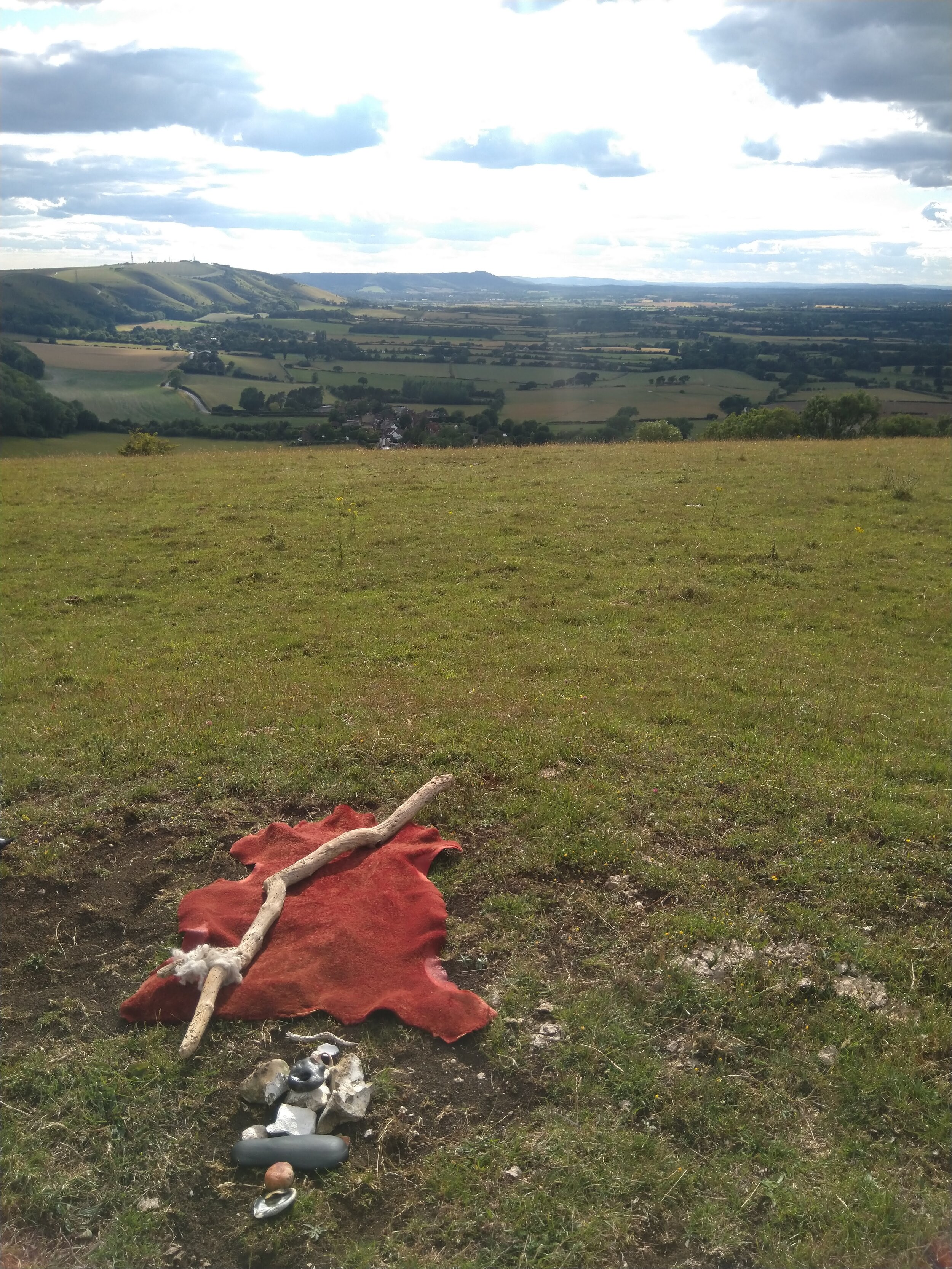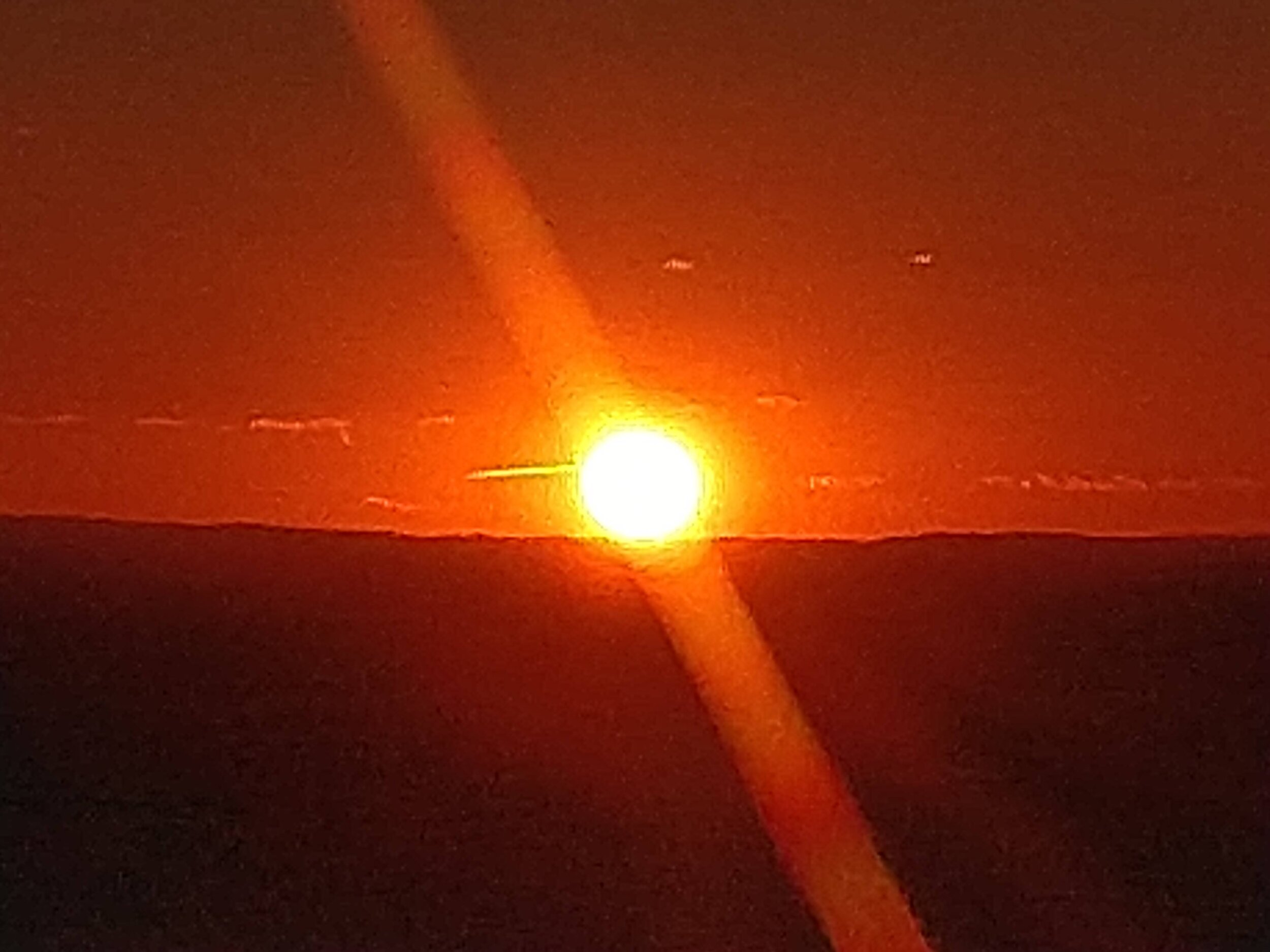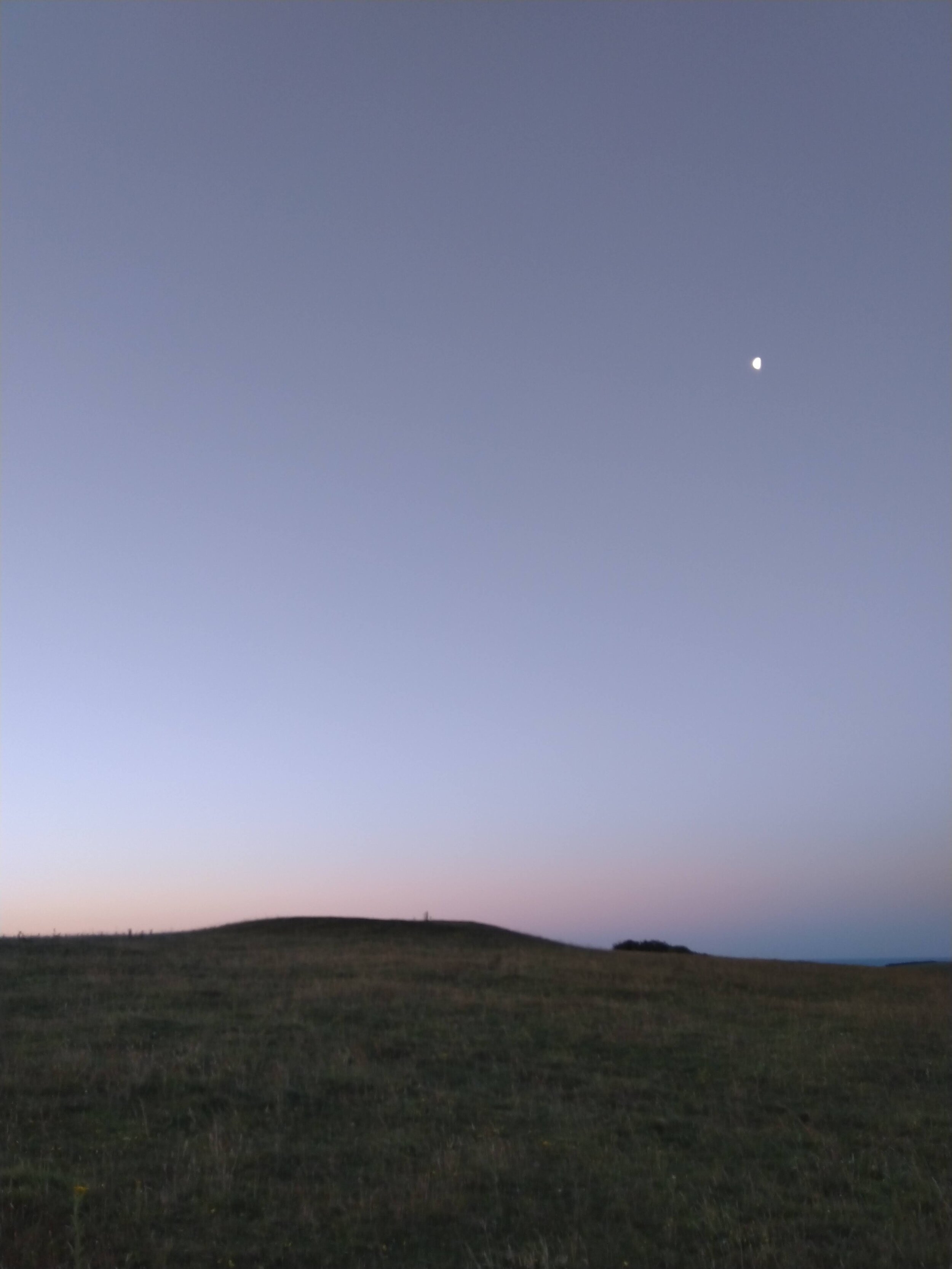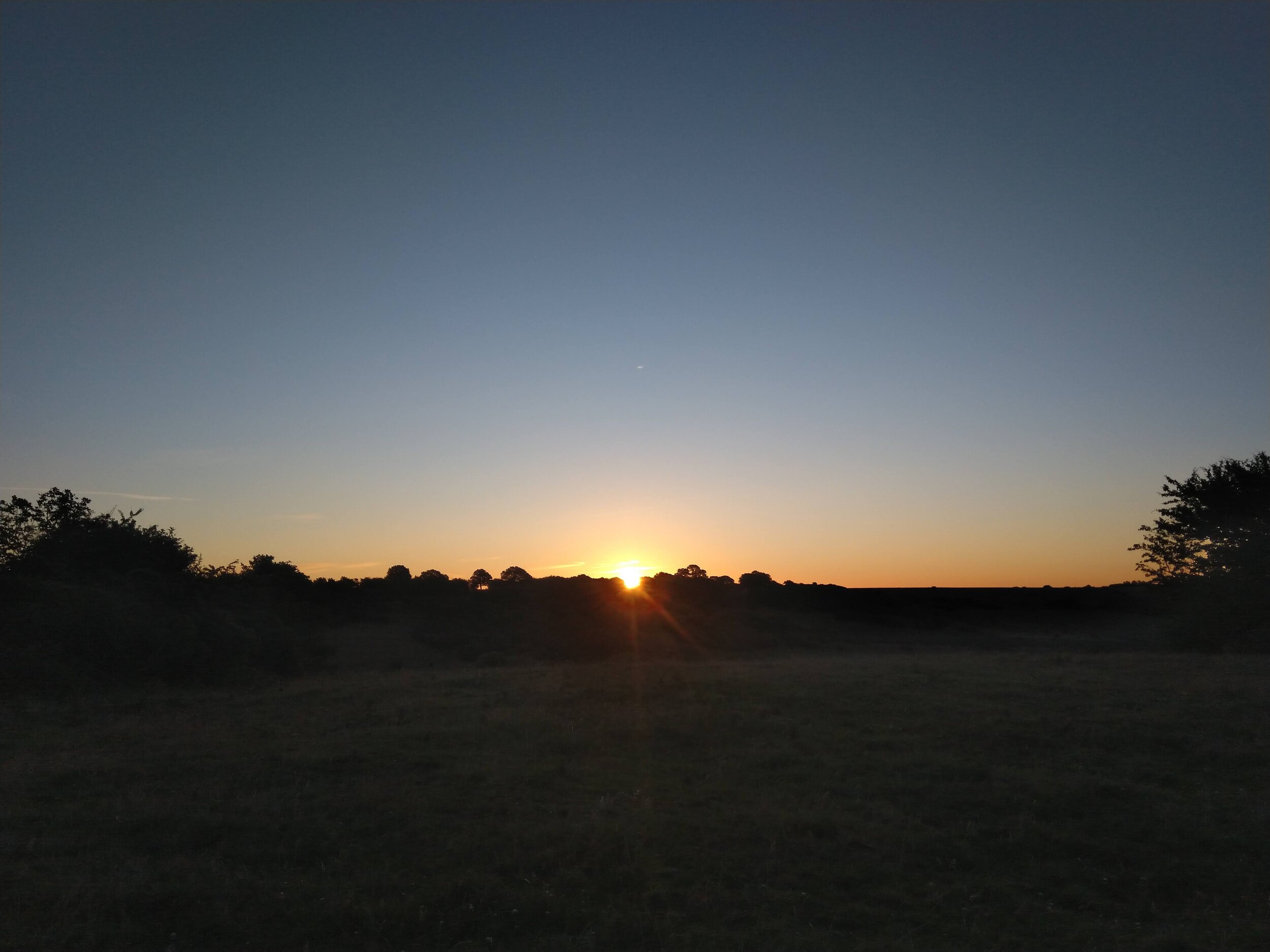A South Downs Utiseta – The Practice of Mound Sitting
The South Downs National Park, Sussex
It is 3.20am, a clear, cool night on the 10 July 2020. The vast canopy of stars and planets above, the milky way faintly shining above the orange glow of the seaside town of Brighton and Hove below to the south. In the distance the constant drone of cars on the main road to London drifts back and forth across the hill. I catch the flash of a shooting star and to the east, just above the horizon, I see Venus rising as the morning star above the black silhouette of the treeline towards the Iron Age hillfort at Woolstonbury Hill. These are the South Downs, the rolling whale-backed chalk ridge that runs from Eastbourne to Winchester across three counties. They hold the remnants of ancient Celtic- Roman temples; Neolithic flint mines; Iron Age hill forts; a giant causewayed encampment at Whitehawk - a huge ceremonial site older than Stonehenge; and Bronze Age, Viking and Saxon burial mounds all intersecting with the myriad of ancient tracks that cross the ridge.
The mound
As I sit on one of these round burial mounds (a protected ancient monument facing an east west alignment on the top of the hill) l can see for miles. I feel so alive within this soft undulating landscape, part of both its seen and unseen worlds. I am a woman alone in the night, reviving the ancient Norse tradition of Utiseta - sitting out- to gain insight and wisdom. I am here to listen to the spirits of the place, of the mound, and what they have to teach me.
This mound is the resting place of high-status figure in the Bronze Age tribe. I sense that ‘she’ is over 5000 years old. She whispered her name in my ear - Ceirchen. I find out later this means oat seed in Welsh. Wild Seed Woman. Ceirchen had called me to step into this night of transformation, transmutation, and initiation to plant a new seed to mark the end of a 101 steps daily ritual. I began this practice on 2 April 2020, not long after the first UK lockdown had started during the Covid-19 pandemic, and it evolved into something quite magical.
101 Steps - a daily ritual
My 101-step practice had been inspired by my studies at the West Country School of Myth and the Siberian tale that master storyteller and course convener Dr Martin Shaw told of Old Kitna and the Wolf. In the story, Old Kitna must take 101 steps to find her missing daughter who she discovers has run off with a pack of wolves. Old Kitna sets out from the village and on the 101st step she shapeshifts into a wolf. As I found my world severely restricted due to the pandemic, I decided to set myself a ‘101 day’ practice to help keep me focused and grounded as everything around me felt like it was collapsing.
This became a daily early morning walk before settling into working from home, come rain or shine, along a stretch of flint beach at the end of my street in Hove. The practice took on a life of its own. As spring was bursting forth in the sudden, temporarily pollution free world of lockdown, I noticed the small things, the detailed attention to beauty in the natural urban world. As the days wore on, I found I had created a temple at the flint stone Pier 13 that was at the end of my walk. I named this my Salty Temple, where it seemed natural to create a daily libation and ritual offering to the sea. Here I noticed what arose in response to my practice, both in nature and in the repose of the few people on the stretch of beach around me.
In this ritual mode, I realised one morning that there is a direct alignment between the Salty Temple and ancient Bronze Age sites in Hove and the surrounding hills. I was in connection to a large old sarsen standing stone, known locally as the Gold Stone and to the north of that, a Bronze Age burial mound high on the Downs above. This hill has been part of my own journey of healing over the years and it dawned on me that I should sit out for 12 hours on this burial mound on what would be the 100th night of my daily practice.
Initiation
This Utiseta felt to be a big initiation for me, as a woman alone sat out all night, on the edge of a city. I did not feel afraid of animals, domestic or wild, or the ‘unseen’. There is a herd of cattle that roams the peak, but they are tolerant if undisturbed. Instead, my fear was deeply rooted in the masculine and the fear of men. Like so many women, I have experienced this fear before; most recently amongst the ancient yew grove of Kingley Vale further west in the South Downs, during a ritual I conducted at Samhain in 2018. The fear of a wild man coming upon me, overpowering, and attacking me was very present. This is the fear that woman have carried for aeons. The feeling of vulnerability that this fear brings makes me angry; that I might be restricted from doing what I wanted because of this fear. The fear spoke to my warrior spirit. How much of the world destruction we are facing was a result of millennia of patriarchal systems of power and control. I began to also understand that this was a fear of my own inner masculine and something that I needed to integrate. My intention was to transmute that fear, to sit with it through the night and in doing so integrate the positive, dynamic power of the masculine and overcome its negative side. Like Old Kitna, I would somehow shapeshift into a Wild Woman.
Preparation
The practice of Utiseta is an old Norse tradition. The wise women, the seers, would sit out on the burial mounds of their ancestors or that of a wise leader, to seek knowledge and to gain answers. To prepare for the ritual I undertook two advance shorter sits, to introduce myself the spirits of the land and of the barrow; to feel the lay of the land and ask its permission for me to work there.
I prepared for the full sit on the preceding two Friday evenings. The first was to sit on the mound until about 11pm after the summer sun had set. I gave offerings and libations to ask permission. Ceirchen, the spirit of the mound made herself known, and welcomed me to work there. She told me her name, and suggested I work with the trees on the hill. I was drawn to an old oak tree which was at least 250 years old. On the second sit, I sat with that tree who also told me her secret name. I felt very supported by this oak. I knew then that I would be working with two spirits of the land: the oak and the barrow.
Working with ancestors
I prepared for the full Utiseta by calling in the ancestors of the land and my own ancestors. Interestingly, this Utiseta was also about working with my male ancestor lines which I have traced back over 1,000 years to Celtic Scots, Irish and Norman-Viking knights and warriors. I called on those I had already worked with in ritual to step forward to help me transmute my fear. I sensed them gathering beneath the mound, with Ceirchen holding the fire she had lit to keep us warm.
Stepping into the night
On the morning walk on the eve of the Utiseta, I met a woman, an artist who was also conducting her own ritual practice at the Salty Temple. We immediately had a strong connection and agreed to open my sit together at 6pm in ceremony whilst I was on the barrow and she was at the Temple, thus re-creating the line which I had intuitively uncovered in the weeks leading up to the sit. This felt to be a strong feminine line from the saltwater to the earth mound. The weather was perfect, warm, and sunny. I had my applewood sea-washed staff, ‘Arrowyn’ which I had found on the beach two years ago. Utiseta is the practice of song, staff, seat and seidr. Seidr contains the magic of the process.
Throughout the sit I sang to the land, and the sang itself back to me. I had moved around the land in the spots I had already marked out and got to know. From 6pm to 9pm I sat with the barrow; from 9pm until midnight I sat with the oak tree. From midnight to 1pm I sat with the skeleton tree (a dead tree trunk on its side) watching the moon rise. There I had an intense experience with a crow nearly landing on my head, which a friend of mine in America had told me she’d had a premonition of a week or so before. I entered a strange, waking dream state back by the oak tree until 3pm, when I stepped back out under the stars and the Milky Way to catch Venus rising as the morning star.
I had sat with the fear, I had walked with the fear, but I felt so held by the barrow, the tree, the stars, the planet, my staff, my song, and my ancestors. At sunrise on the barrow, a large golden hound bounded towards me out of nowhere over the hill brow, almost bowling me over with such pure energetic joy before suddenly running off again without another human in sight. As I welcomed the firebird at dawn, singing to her as she lit up the sky, I understood that there is still an old magic in the land, even so close to the edge of a city. The edge dwellers, the old ones, the ancestors, are waiting for us to remember them, to work with them. They want us to connect and listen.
Three gifts of seer sight
There was much magic that I encountered throughout my 101 steps and my Utiseta. The insights that I gained are evolving into a small creative book. If you want to be the first to know when it’s ready to order, then do like my Facebook page.
However, I would like to leave you with three gifts that the process gave me:
Be open to synchronicities and following what arises in intuitive response
Facing fear is an initiation, but our ancestors will step forward to hold and carry us through the dark night of transmutation, if we are willing to let them assist us.
Humans are miniscule, we are nothing in the face of the great cosmos. There is so much that disrupts our seemingly ordered routines to send us scurrying in denial and chaos. The only way we will survive is if we work together in community and in a deep respectful relationship with the land.
Finally, do remember to sing to the land, wherever you sit.
This article was first published in the January 2021 print edition of Finnish magazine Mina Olen, translated into Finnish by Tosha Einio.




